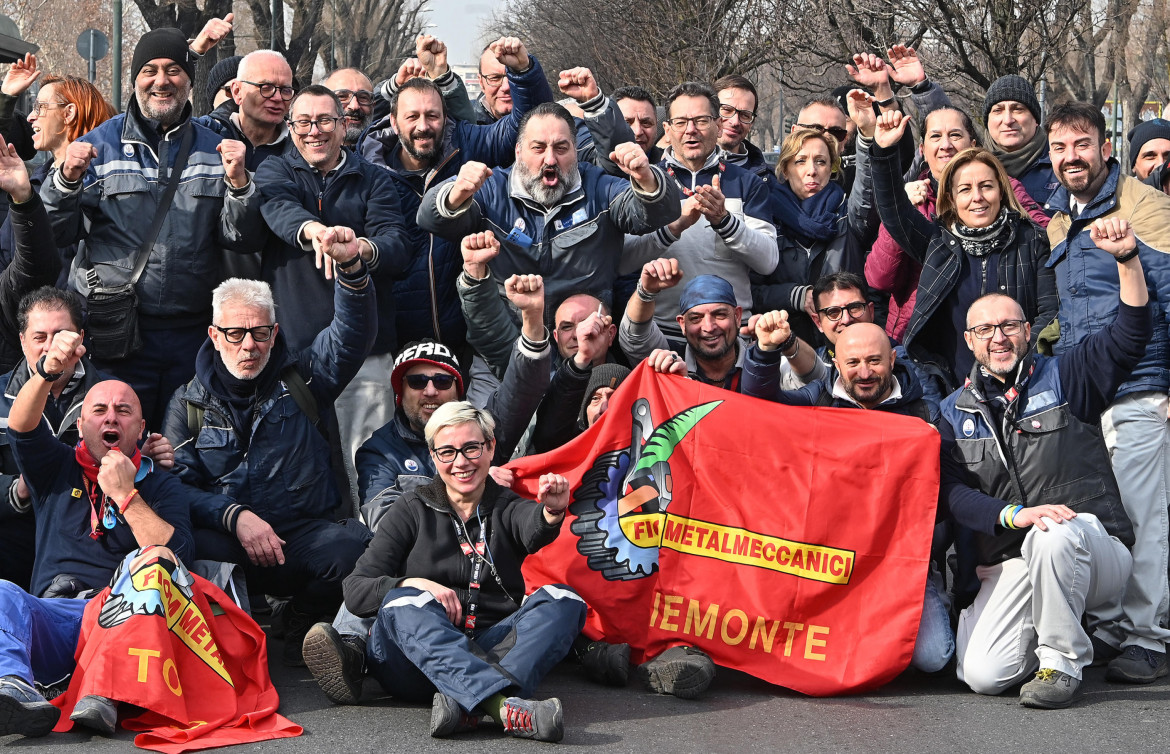Analysis
United strike is no long taboo for Italy’s major metalworker unions
No plan for the future of auto plants, with thousands of jobs at stake. ‘When workers spontaneously go on strike, it means the situation has reached the breaking point.’

The anger of Italian Stellantis workers is growing every day, not only at the company but directly at the Meloni government. And the idea of a historic united strike across the group is no longer unthinkable.
By Friday, at Mirafiori there had been the third spontaneous strike in two days, and the Campania region had shown a united front in defense of the workers at Pomigliano (4,500 employees) and Pratola Serra (1,600), with Regional President Vincenzo De Luca meeting with all the unions and railing against “the government that has no industrial plan on the auto industry. In two years, we risk being out of business.”
As of Friday, the FIM, FIOM and UILM metalworkers’ unions were still waiting for a response to their joint request for “a meeting at the Palazzo Chigi with [Stellantis CEO] Tavares and Meloni.” But there has been only silence from the government, with the lone exception of the Minister for Business and Made in Italy, Adolfo Urso, who on Thursday was the protagonist of yet another comical episode: from Brussels, where he met with Commissioners Breton and Vestager, he hinted to Tavares that he should “soon” build a battery gigafactory in Italy. He seemed to have forgotten that he himself had already written a €270-million check to a consortium led by Stellantis for the reconversion of the Termoli plant, without as much as a guarantee of the timeframe for the implementation of the project and – even worse – without any guarantee that the 2,080 workers at the plant will keep their jobs. The ACC joint venture including Stellantis, Mercedes and Total, which was in talks 10 days ago at Urso’s own ministry, announced that at full capacity it would need “1,800 employees with very stringent professional requirements,” which seems to exclude the employees already at Termoli.
Such backroom dealings continue to cause irritation among Stellantis’ 45,000 direct employees, plus an equal number working in the supply chain.
At Mirafiori, the workers’ meetings organized by FIOM on Wednesday continued in the same vein as before: very high participation – 600 workers in the morning, 400 in the afternoon – including by non-union members, and a decision by the workers to immediately go on a spontaneous strike on the day the company had officially announced the end of production of the Maserati Levante SUV at the end of March. The news was expected, but it seemed to confirm the fears about the future of the plant.
“When workers spontaneously go on strike, it means the situation has reached the breaking point. There is no more time to lose, we must act immediately,” says the secretary of FIOM Turin, Edi Lazzi. “Solutions can be found starting with the proposals put forward by FIM, FIOM and UILM Turin regarding Mirafiori. They are concrete proposals for the city, for the manufacturing industry, for the economy in general,” he adds. “In this way, we would have a better chance of convincing Stellantis, and others, that producing cars here is still very good business, not only because of 120 years of specialized skills, but because we have an organic project on cars and electrification.”
The word “strike” is starting to circulate among FIM CISL and UILM members as well, despite the fact that they signed the company contract (CCSL) inherited by Stellantis from the Marchionne era, which stipulates that a plant strike requires a prior cooling-off procedure and leads to the loss of “union allowances,” first and foremost leave for union activities. On the other hand, even the “Marchionne contract” doesn’t set limits on unified and territorial strikes.
A meeting was set to be held on Friday in Turin between the CGIL, CISL and UIL union confederations and the three metalworker federations, FIM, FIOM and UILM, to decide on a joint course of action, without taking any option off the table.
“We must have a smart approach to things to get to the point of having a new consumer car model at Mirafiori and an in-depth discussion with the government and the company. Getting ahead of ourselves is not what we need,” said Ferdinando Uiliano, the secretary of FIM CISL.
“For Mirafiori, we are asking for one more model after the end of the Maserati ones,” explains Gianluca Ficco, the national secretary of UILM. “But, more generally, it’s time for the government and Stellantis to agree to have a substantive discussion on production, plant by plant.”
Originally published at https://ilmanifesto.it/stellantis-mirafiori-capofila-lo-sciopero-non-e-piu-un-tabu on 2024-02-09
